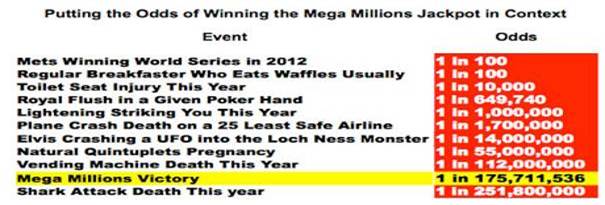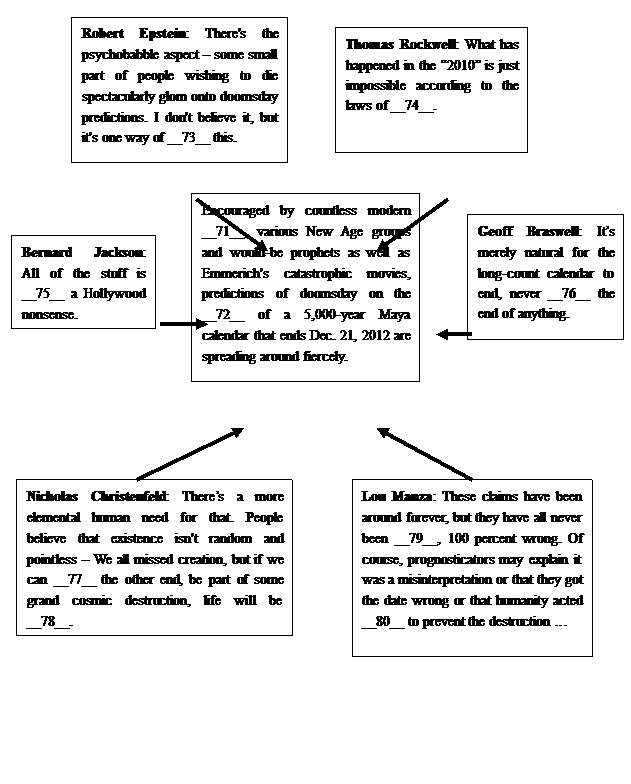
A small part the population are believed to have no to the health care in the west rural area of the country.
|
A.aid |
B.basis |
C.access |
D.belief |
 阅读快车系列答案
阅读快车系列答案科目:高中英语 来源:河北省邢台一中2011-2012学年高二下学期第四次月考英语试题 题型:050
| |||||||||||||||||||||||||||||||||||||||||||||||||||||||||||
查看答案和解析>>
科目:高中英语 来源:2012届浙江省名校新高考研究联盟高三第二次联考英语试卷(带解析) 题型:阅读理解
My father is a smart man. He spent many years of his life listening to people’s arguments, first as assistant district lawyer and then as a judge. My dad knows rubbish rhetoric when he hears it.
One of his favorite phrases is: “If you don’t have anything smart to say, then don’t say it at all.” Yet, for all of his legal training and life experience, he can’t help but keep talking about the Mega Millions jackpot.
We all know the odds(几率)of winning the jackpot this evening with one ticket are extraordinarily low ... 1 in 175, 711, 536, to be exact. Still, people go out and buy hundreds of tickets with the hopes of becoming wealthier beyond their dreams. Why? There are two possible explanations for this “irrationality”(不理智).
One idea is that the way we calculate odds in our heads has nothing to do with mathematical odds in the traditional sense. We don’t go to the mathematical odds table and say, “Well, this would be a terrible investment. I think I’m better off putting my money in the bank!” Rather, it has everything with the ability to picture an event happening.
My father, for instance, watches the news every night and sees people winning the lottery(彩票). Therefore, he thinks the chance of him winning the lottery is much higher than they actually are.
The second thought is that the expected effect of playing cannot be represented merely by the odds. My father and, I’m sure, others get a thrill from the mere idea of winning. He loves imagining what it would be like to actually win and losing doesn’t really affect him. Sure, he’s disappointed, but it’s “better to have loved and lost than never to have loved at all.” When you combine the utility of thinking you can win with the utility of actually winning (no matter how small the chance of that occurring), it’s worth it for many people to spend the one dollar on a ticket.
My analysis is that both factors are at play in taking a chance on the lottery. My father and others really do underestimate the odds of winning, but the thrill of participation is not denied by a realistic assessment of the odds. Still, I would probably put my finger on the scale for the first explanation.
All told, a review of the odds of other events happening confirms that there just aren’t many events that occur with less frequency than your winning the Mega Millions jackpot. Look at the graph below, you may understand some:
In many ways, it’s like the lottery, something that features often on television and about which people fantasize, but that rarely happens.
So, when you watch, along with my Pa, to see if your lucky number is drawn this evening, keep in mind three things: that your number almost certainly won’t come up; that you are still going to have fun; and that, finally, a lot of other things are more likely to happen—but getting eaten by a shark isn’t one of them.
【小题1】It can be learned from the article that ________.
| A.the Mega Millions jackpot is the last lottery to win in the world |
| B.a judge in that country can’t talk about lottery because it is illegal |
| C.the writer doesn’t buy lottery, for he never hopes to become rich |
| D.In spite of little possibility, a lot of people spend money on lottery |
| A.show chances that those things take place are fewer |
| B.support the writer’s arguments on the lottery tickets |
| C.indicate no one can win the Mega Millions jackpot |
| D.say shark attack death will seldom happen this year |
| A.If one has mathematical odds, he can win the prize more easily. |
| B.Only those who have irrationality buy hundreds of lottery tickets. |
| C.The Mega Millions jackpot is very popular in the writer’s country. |
| D.Winning lottery is a shortcut to achieve the dream of being rich. |
| A.effective | B.ridiculous | C.contradictory | D.astonishing |
| A.The Popular Mega Millions Jackpot | B.Lottery is Merely a Trick |
| C.Mega Million is Like a Shark Attack | D.Be rich, Buy Lottery Soon |
查看答案和解析>>
科目:高中英语 来源:江苏省20092010学年高二下学期期末考试试题(英语) 题型:任务型阅读
第四部分:任务型阅读(共10小题;每小题l分,满分10分)
请认真阅读下列短文,并根据所读内容在文章后表格中的空格里填入一个最恰当的单词。注意:每个空格只填1个单词。请将答案写在答题卡上相应题号的横线上。
Experts debunk Maya doomsday(末日) predictions -- But that hasn't stopped books, movies from cashing in.
If the ancient Maya and filmmaker Roland Emmerich are correct, the apocalypse(大灾变) will happen very fast, maybe quicker than his new 2½-hour movie.
Predictions of global ruination are rippling around the globe with seismic(地震的) force, all loosely based on a 5,000-year Maya calendar that ends Dec. 21, 2012. Countless Web sites and blogs anticipate(预料) the end of days, as do various New Age groups and would-be prophets(预言者) offering guidance and how-to tips. On Amazon.com , you can read hundreds of book titles combining the year 2012 with terms such as “apocalypse,” “catastrophe” and “end of the world.”
As always, doomsday sells — and a lot of people are buying it.
“There's the psychobabble(心理呓语) aspect,” said Robert Epstein, former editor of Psychology Today magazine and a lecturer at the University of California San Diego. “It's the Sigmund Freud/death wish idea: People glom onto(对…感兴趣) doomsday predictions because there's some small part of them that wants to die, and die spectacularly(壮观的). I don't believe it, but it's one way to look at this.”
It's Emmerich's way. The German director specializes in wreaking havoc on an epic scale, from climatic cataclysm in 2004's “The Day After Tomorrow” to angry aliens and reptiles in “Independence Day” and “Godzilla.” In “2012,” he finishes the job.
The digitized disasters of “2012” are oversized, overwrought and sometimes literally over the top, as when a humongous tsunami washes over the Himalayan mountains, whose average height exceeds 20,000 feet. Meanwhile in Los Angeles, a 10.5-magnitude earthquake — a temblor at least 30 times more powerful than any real quake ever recorded — yanks the city apart like a giant zipper, sending chunks sliding into the Pacific Ocean.
That's not physically possible, of course. Nor is a 10.5-magnitude quake, said Thomas Rockwell, a geologist at San Diego State University. To generate that much energy, “you'd need a rupture that extends all around the planet.”
All of that other stuff “is pure Hollywood bunk,” said Bernard Jackson at the UCSD Center for Astrophysics and Space Sciences.
Entertaining, though, unless you happen to believe the Maya really predicted the end of the world. They didn't, said Geoff Braswell, a UCSD anthropologist. The long-count calendar doesn't signal the end of anything except the end of that particular calendar. “It's just like a car odometer. Unfortunately, hardly anybody reads ancient Mayan. Modern media hype(骗局), on the other hand, is almost inescapable.
Nicholas Christenfeld, a professor of psychology at UCSD, suggests a more elemental human need. Being swallowed by the Earth or incinerated in a giant fireball “fits neatly with the idea that people want to believe there's a plan, that existence isn't random and pointless,” Christenfeld said.
“We all missed creation, but if we can bear witness at the other end, be part of some grand cosmic destruction, that gives life meaning,” he said.
It helps, too, not to think very hard about the facts, said Lou Manza, a professor of psychology at Lebanon Valley College in Annville, Pa. “These claims have been around forever, and they have all been false, 100 percent wrong,” Manza said.
Of course, prognosticators(预言者, 占卜者) usually have an explanation for that, Christenfeld said.
“They might say it was a misinterpretation,” he said. “They got the date wrong. They might claim humanity acted in time to prevent the destruction. Or faith came to the rescue because people believed something bad was going to happen, it didn't have to happen.”
查看答案和解析>>
科目:高中英语 来源: 题型:阅读理解
第四部分:任务型阅读(共10小题;每小题l分,满分10分)
请认真阅读下列短文,并根据所读内容在文章后表格中的空格里填入一个最恰当的单词。注意:每个空格只填1个单词。请将答案写在答题卡上相应题号的横线上。
Experts debunk Maya doomsday(末日) predictions -- But that hasn't stopped books, movies from cashing in.
If the ancient Maya and filmmaker Roland Emmerich are correct, the apocalypse(大灾变) will happen very fast, maybe quicker than his new 2??-hour movie.
Predictions of global ruination are rippling around the globe with seismic(地震的) force, all loosely based on a 5,000-year Maya calendar that ends Dec. 21, 2012. Countless Web sites and blogs anticipate(预料) the end of days, as do various New Age groups and would-be prophets(预言者) offering guidance and how-to tips. On Amazon.com , you can read hundreds of book titles combining the year 2012 with terms such as “apocalypse,” “catastrophe” and “end of the world.”
As always, doomsday sells — and a lot of people are buying it.
“There's the psychobabble(心理呓语) aspect,” said Robert Epstein, former editor of Psychology Today magazine and a lecturer at the University of California San Diego. “It's the Sigmund Freud/death wish idea: People glom onto(对…感兴趣) doomsday predictions because there's some small part of them that wants to die, and die spectacularly(壮观的). I don't believe it, but it's one way to look at this.”
It's Emmerich's way. The German director specializes in wreaking havoc on an epic scale, from climatic cataclysm in 2004's “The Day After Tomorrow” to angry aliens and reptiles in “Independence Day” and “Godzilla.” In “2012,” he finishes the job.
The digitized disasters of “2012” are oversized, overwrought and sometimes literally over the top, as when a humongous tsunami washes over the Himalayan mountains, whose average height exceeds 20,000 feet. Meanwhile in Los Angeles, a 10.5-magnitude earthquake — a temblor at least 30 times more powerful than any real quake ever recorded — yanks the city apart like a giant zipper, sending chunks sliding into the Pacific Ocean.
That's not physically possible, of course. Nor is a 10.5-magnitude quake, said Thomas Rockwell, a geologist at San Diego State University. To generate that much energy, “you'd need a rupture that extends all around the planet.”
All of that other stuff “is pure Hollywood bunk,” said Bernard Jackson at the UCSD Center for Astrophysics and Space Sciences.
Entertaining, though, unless you happen to believe the Maya really predicted the end of the world. They didn't, said Geoff Braswell, a UCSD anthropologist. The long-count calendar doesn't signal the end of anything except the end of that particular calendar. “It's just like a car odometer. Unfortunately, hardly anybody reads ancient Mayan. Modern media hype(骗局), on the other hand, is almost inescapable.
Nicholas Christenfeld, a professor of psychology at UCSD, suggests a more elemental human need. Being swallowed by the Earth or incinerated in a giant fireball “fits neatly with the idea that people want to believe there's a plan, that existence isn't random and pointless,” Christenfeld said.
“We all missed creation, but if we can bear witness at the other end, be part of some grand cosmic destruction, that gives life meaning,” he said.
It helps, too, not to think very hard about the facts, said Lou Manza, a professor of psychology at Lebanon Valley College in Annville, Pa. “These claims have been around forever, and they have all been false, 100 percent wrong,” Manza said.
Of course, prognosticators(预言者, 占卜者) usually have an explanation for that, Christenfeld said.
“They might say it was a misinterpretation,” he said. “They got the date wrong. They might claim humanity acted in time to prevent the destruction. Or faith came to the rescue because people believed something bad was going to happen, it didn't have to happen.”

查看答案和解析>>
科目:高中英语 来源:同步题 题型:阅读理解
查看答案和解析>>
湖北省互联网违法和不良信息举报平台 | 网上有害信息举报专区 | 电信诈骗举报专区 | 涉历史虚无主义有害信息举报专区 | 涉企侵权举报专区
违法和不良信息举报电话:027-86699610 举报邮箱:58377363@163.com